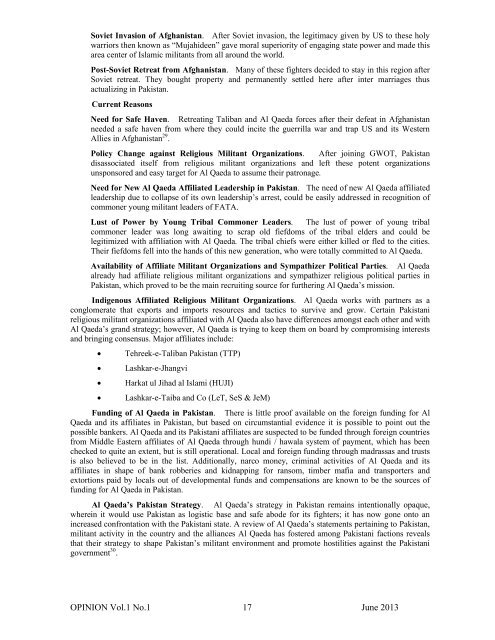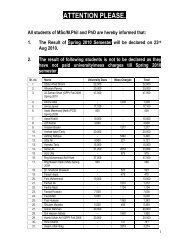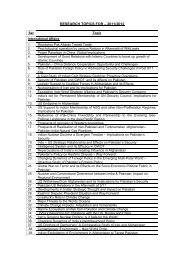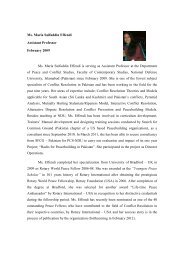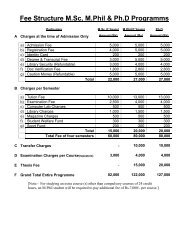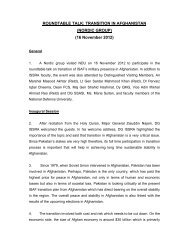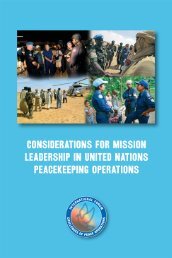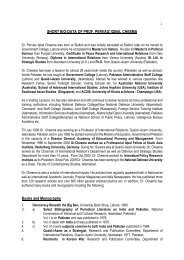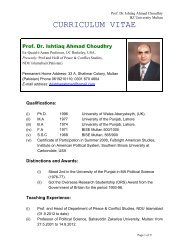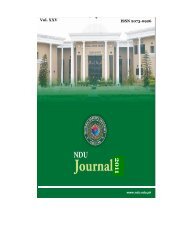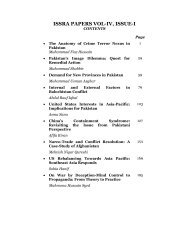OPINION Vol.1, No.1 June 2013 - National Defence University
OPINION Vol.1, No.1 June 2013 - National Defence University
OPINION Vol.1, No.1 June 2013 - National Defence University
You also want an ePaper? Increase the reach of your titles
YUMPU automatically turns print PDFs into web optimized ePapers that Google loves.
Soviet Invasion of Afghanistan. After Soviet invasion, the legitimacy given by US to these holy<br />
warriors then known as “Mujahideen” gave moral superiority of engaging state power and made this<br />
area center of Islamic militants from all around the world.<br />
Post-Soviet Retreat from Afghanistan. Many of these fighters decided to stay in this region after<br />
Soviet retreat. They bought property and permanently settled here after inter marriages thus<br />
actualizing in Pakistan.<br />
Current Reasons<br />
Need for Safe Haven. Retreating Taliban and Al Qaeda forces after their defeat in Afghanistan<br />
needed a safe haven from where they could incite the guerrilla war and trap US and its Western<br />
Allies in Afghanistan 29 .<br />
Policy Change against Religious Militant Organizations. After joining GWOT, Pakistan<br />
disassociated itself from religious militant organizations and left these potent organizations<br />
unsponsored and easy target for Al Qaeda to assume their patronage.<br />
Need for New Al Qaeda Affiliated Leadership in Pakistan. The need of new Al Qaeda affiliated<br />
leadership due to collapse of its own leadership’s arrest, could be easily addressed in recognition of<br />
commoner young militant leaders of FATA.<br />
Lust of Power by Young Tribal Commoner Leaders. The lust of power of young tribal<br />
commoner leader was long awaiting to scrap old fiefdoms of the tribal elders and could be<br />
legitimized with affiliation with Al Qaeda. The tribal chiefs were either killed or fled to the cities.<br />
Their fiefdoms fell into the hands of this new generation, who were totally committed to Al Qaeda.<br />
Availability of Affiliate Militant Organizations and Sympathizer Political Parties. Al Qaeda<br />
already had affiliate religious militant organizations and sympathizer religious political parties in<br />
Pakistan, which proved to be the main recruiting source for furthering Al Qaeda’s mission.<br />
Indigenous Affiliated Religious Militant Organizations. Al Qaeda works with partners as a<br />
conglomerate that exports and imports resources and tactics to survive and grow. Certain Pakistani<br />
religious militant organizations affiliated with Al Qaeda also have differences amongst each other and with<br />
Al Qaeda’s grand strategy; however, Al Qaeda is trying to keep them on board by compromising interests<br />
and bringing consensus. Major affiliates include:<br />
<br />
<br />
<br />
<br />
Tehreek-e-Taliban Pakistan (TTP)<br />
Lashkar-e-Jhangvi<br />
Harkat ul Jihad al Islami (HUJI)<br />
Lashkar-e-Taiba and Co (LeT, SeS & JeM)<br />
Funding of Al Qaeda in Pakistan. There is little proof available on the foreign funding for Al<br />
Qaeda and its affiliates in Pakistan, but based on circumstantial evidence it is possible to point out the<br />
possible bankers. Al Qaeda and its Pakistani affiliates are suspected to be funded through foreign countries<br />
from Middle Eastern affiliates of Al Qaeda through hundi / hawala system of payment, which has been<br />
checked to quite an extent, but is still operational. Local and foreign funding through madrassas and trusts<br />
is also believed to be in the list. Additionally, narco money, criminal activities of Al Qaeda and its<br />
affiliates in shape of bank robberies and kidnapping for ransom, timber mafia and transporters and<br />
extortions paid by locals out of developmental funds and compensations are known to be the sources of<br />
funding for Al Qaeda in Pakistan.<br />
Al Qaeda’s Pakistan Strategy. Al Qaeda’s strategy in Pakistan remains intentionally opaque,<br />
wherein it would use Pakistan as logistic base and safe abode for its fighters; it has now gone onto an<br />
increased confrontation with the Pakistani state. A review of Al Qaeda’s statements pertaining to Pakistan,<br />
militant activity in the country and the alliances Al Qaeda has fostered among Pakistani factions reveals<br />
that their strategy to shape Pakistan’s militant environment and promote hostilities against the Pakistani<br />
government 30 .<br />
<strong>OPINION</strong> <strong>Vol.1</strong> <strong>No.1</strong> 17 <strong>June</strong> <strong>2013</strong>


